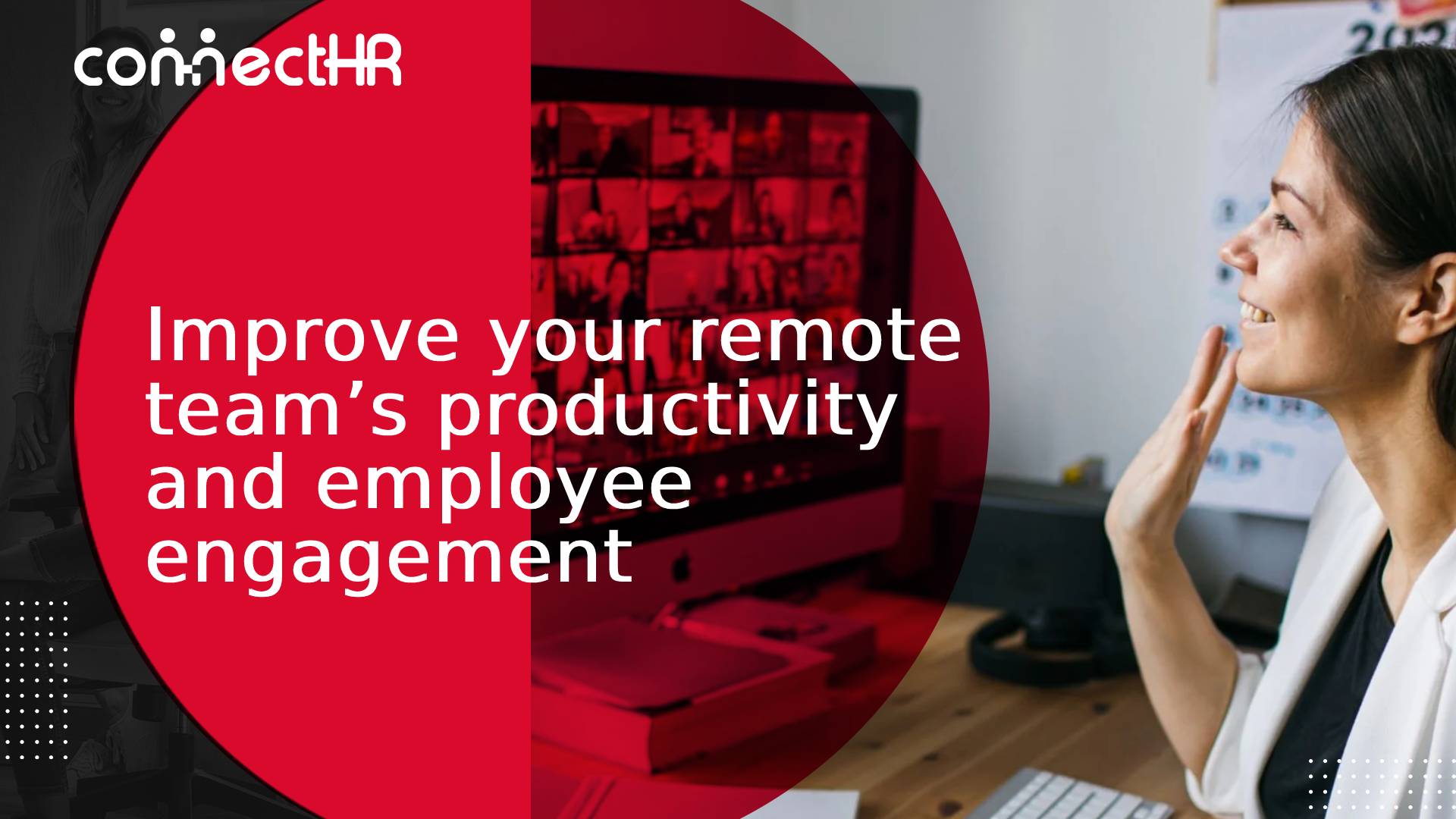Following the COVID-19 epidemic, a new work paradigm has emerged in the labour market: remote work. The issue is that 70% of businesses were unprepared for this transformation, which has impacted productivity and employee engagement. As a result, companies are increasingly reliant on employee management software.
In this article, we will discuss ways to boost your remote team’s productivity and employee engagement. Because these employees are not located in the firm, it is not easy to maintain control over them. That is why it is critical to boost these employees’ involvement to see an increase in the organization’s production.
- How has the employment landscape changed in the last four years?
- What is a remote team?
- Which are the challenges that HR faces with remote teams?
- What is the significance of company culture for remote teams?
- How to manage remote teams to improve engagement and productivity?
- Is it beneficial for your organization to have remote teams?
- Do not let your remote teams become a headache, and improve their productivity thanks to Connect HR’s solutions
1. How has the employment landscape changed in the last three years?
COVID-19 has significantly influenced the global population, both in terms of health and economics. Moreover, it was a significant revolution in the business industry since it altered how organizations function in 2022. As a result, one of the developments affecting businesses is remote working.
It is atonishing to see in how many different ways it has changed our working techniques. One of the most significant factors has been reducing the employment of over 65% of the enterprises. Companies have been forced to hire to compensate for this failure.
However, one factor contributing to this pandemic was the normalizing of a specific work model: remote work. Unfortunately, this strategy has caused people to put their well-being over reducing workplace stress. Although it may not appear so, this has been a reoccurring issue for businesses during the previous 20 years.
As a result, adopting such flexible work patterns is growing more familiar with each passing day. As a result, businesses are still integrating into this new work normality. Despite this, this new mode of operation has demonstrated substantial advantages in terms of the company’s productivity—something to consider in today’s corporate world.
2. What is a remote team?
With this explanation comes many unknowns, but what exactly is remote work? Or, what are the roles of remote teams inside the organization? In a word, remote work is work that is completed outside of the usual office context: employees complete projects and everyday tasks without having to report to headquarters every day.
As a result, a remote team is a collection of individuals who operate from multiple locations scattered across cities, nations, and even continents. Despite having remote team records since 2010, the presence of this digital deluge has risen. Even to the point where, by 2022, over 40% of employees globally will be working in this manner.
Applications, tools, and digital ecosystems have developed due to the proliferation of remote teams. As a result, businesses have witnessed an improvement in organizational productivity. This is due to employee perks such as improved work-life balance and more real job options.
Despite this, organizations are having difficulty managing such remote teams. In addition, HR management becomes more complex when the employee does not work on a set schedule or in an office. As a result, businesses realize the importance of using solutions such as employee management software.
3. Which are the challenges that HR faces with remote teams?
Human resources departments have been in flux over the past decade. This is because of the widespread use of the digital era in commercial enterprises. Hence, transitioning from manual management and procedures to digital-based strategic initiatives.
Furthermore, the deployment of remote work has led human resources to reconsider their strategy. As a result, the various processes carried out by these departments have gotten more complicated. As a result, managers and HR departments must be aware of the elements that might make remote work particularly difficult.
When high-performing individuals begin working remotely, their job performance and engagement may suffer, especially when the company’s management lacks planning and training. As a result, it is critical to clarify various challenges that HR could face when working with remote teams.
3.1 Lack of access to the company’s information
Newly remote employees are frequently shocked by the extra time and effort required to seek information from peers. Even finding answers to seemingly effortless inquiries might feel like a significant challenge for a worker located from home. This tendency goes outside task-related work to internal conflicts that might arise between distant employees.
When these issues arise with in-office employees, management becomes considerably more manageable. Because you may quickly provide accessibility to the organization’s information by using HR techniques. However, conveying the information to distant teams might be difficult. This is shown in decreased productivity when performing out the organization’s activities.
3.2 Insufficient remote equipment monitoring
Managers and workers alike frequently express worry about the loss of face-to-face engagement. Likewise, supervisors are concerned that their staff will not try as hard or even as effectively as they should. This is a natural reaction because not being able to watch them gives them the benefit of the doubt
personally.
On the other hand, many employees have difficulties due to limited access to management support and communication. Employees may believe that remote bosses are out of touch with their requirements and, as a result, are neither supporting nor helping in getting their work done. As a result, the effectiveness of the HR department efforts is jeopardized.
3.3 Distractions at home that affect productivity
In many circumstances, remote working is marketed as the ability to work from home while attending to other duties (children, household chores, and more). This is a misunderstanding of what a productive remote team is searching for. Devoting considerable time and attention to specific other tasks might result in a lack of concentration on job responsibilities.
Even under normal conditions, family and home obligations can interfere with remote work; supervisors should anticipate these distractions would be higher during an unforeseen work-from-home shift. Attendance management software is one method to keep track of this.
The employee attendance management system allows remote teams to govern the amount of time they spend working. These systems track the number of hours worked, which days are worked and which are not, among other things. As a result, it will be easy to determine how to motivate employees to be more responsible with their job obligations.
4. What is the significance of company culture for remote teams?
Because of the beneficial influence on employee engagement, your business culture lays the groundwork for your success. In addition, a cohesive organizational culture is more likely to result in lower absenteeism and higher productivity. On the other hand, fostering a business culture might be difficult with a scattered staff.
As a result, it is critical for you, as a leader, to overcome this barrier and develop healthy remote work culture. One answer is to portray the corporate culture in a straightforward, eloquent, and engaging manner. In this method, you will motivate the remote team to give their all for the team to succeed.
You may also describe the standards and interests that are in line with the company’s goals. It is beneficial to include your company’s fundamental values to unite your remote staff and keep them focused on your organization’s objectives. To foster openness and transparency, contact and feedback should be encouraged.
Human Resources is in charge of communicating with each member and learning more about their personality. Using this special attachment and their professional performance, you may show them that they are vital to the organization. Having a business culture can help to unite your dispersed staff and enable you to reach your mission and targets in unison.
5. How to manage remote teams to improve engagement and productivity?
Managing remote teams is difficult at first, but it is possible to do it efficiently. As a leader, you must have systems that assist several things, such as improved communication, accountability, streamlining work processes, fostering business culture, and increasing engagement.
Companies must streamline remote team communication for remote teams to be successful. It fosters a positive working connection among the group and helps to boost morale. In addition, it impacts how team members interact with one another and their job. This has a favorable impact on the overall performance and productivity of the organization.
When supervising a remote workforce, another issue to consider is productivity. Human resources must streamline work procedures to guarantee that each member can produce their product effectively. This is because streamlining and efficiency go together. As a result, create a structured approach that remote workers can follow.
Furthermore, employee engagement is a factor. Employee engagement is critical in an office context, but it is more acute in remote work situations. One of the primary reasons for remote team turnover is a lack of connection with the firm. The solution is to inform them that their involvement is critical to accomplishing the company’s goals.
5.1 How can Employee Management Software improve these crucial factors?
Companies will use digital technologies to manage their personnel in 2022. Employee management software provides many advantages to organizations in terms of productivity and employee engagement. HR companies developed these solutions to strengthen these two characteristics, the most critical factor in creating a solid and successful staff.
Things do not alter much when it relates to a remote team. Cloud-based time management software and other types of software operate remotely. This allows the HR staff to develop workforce management strategies regardless of whether they work in the office or remotely.
The automation of HR operations is the key to employee management software in remote teams. This enables HR to better control remote teams without jeopardizing its other tasks. HRMS tools, for example, will assist HR in maintaining control and correctly managing all the company’s work teams.
6. Is it beneficial for your organization to have remote teams?
Implementing remote teams might be helpful if personnel management is done effectively. Working more innovative frequently involves utilizing the substantial advantages of a remote workforce in a highly competitive market. Furthermore, simple-to-use, low-cost technological solutions make this deployment a snap.
Nonetheless, remote teams are just as important as in-office work teams. However, because of this modality’s benefits, it can bring numerous benefits to the company. Employees are more productive once they have the freedom to select when and how they work. All of this is possible if remote team management is done appropriately.
Some of the benefits that your organization can obtain from remote teams are:
- Reduced turnover of employees
- Productivity and effectiveness
- Improvements in employee well-being
- The increased top-talent field when it comes to recruitment
- Reduced office costs
7. Do not let your remote teams become a headache, and improve their productivity thanks to Connect HR’s solutions
As businesses grow increasingly globally and digitally, the business environment will change. That is why, with digital systems in place, firms with totally remote workers will prosper. However, instead of using different technologies that might stymie productivity, look for a holistic solution that tackles remote work’s issues.
At Connect HR, we provide you with the best options for managing your personnel, both remotely and in-office. Our company developed these solutions due to decades of expertise honing HR tasks. As a result, we have become one of the most satisfactory solution suppliers in the UAE.
Our attendance software is the answer you need to manage your remote workers’ working hours and days. However, if you want a wider variety of benefits, you cannot go wrong with our HRMS software. It will sync your entire organization’s employee management in a single software. So do not fall behind, and start using remote teams right now!

Would you like to contact us for more information about our company’s employee management software? If you have questions about our solutions and services, call us at +971 43 316 688 or write us at [email protected].
Also, start working with us! Go to thetalentpoint.com, upload your resume or CV, and apply for one of the vacancies available. Also, you can send your applications to [email protected]. Do not miss the opportunity to work with a top company from the Middle East.





